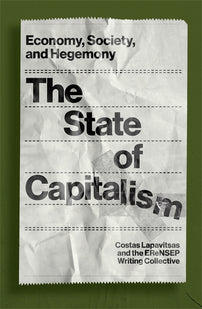Imperialism in Theory
Costas Lapavitsas and the EReNSEP Writing Collective take a historically concrete approach to try to fix the meaning of imperialism in political economy.

Empires long predate the emergence of capitalism and its world market. Examples abound – ancient China could be considered an early empire, while the Achaemenids of Persia formed a vast empire in the sixth century BCE, followed by Alexander of Macedon in the fourth century BCE. Rome remains a historical benchmark for European expansionism and has bequeathed the characteristic terms of imperial rule to several European languages. Empires would look even more varied if other political formations were also considered, from the Mongols to Mali, the Incas, and so on.
It follows immediately that there can be no transhistorical definition of imperialism. The historical commonalities that potentially exist among empires, such as the exploitation of the dominated, or the cultural and linguistic supremacy of a hegemonic group, are not sufficient for a theoretical understanding of imperialism, especially one that casts light on modern expansionism. Analysis of successive capitalist empires, furthermore, requires a historically concrete approach that is able to fix the meaning of imperialism in terms of political economy, while allowing for variation in both form and content.
The global European ascendancy that commenced at about the time of Columbus’s journey to the Americas and closed with the First World War was incontrovertibly aggressive and empire-creating. Once mercantile capitalism had properly stirred in the sixteenth century, economic, military, cultural, and political expansion became the aim of the major European powers. The aggressive, exploitative, and oppressive nature of early European expansionism is not in dispute. The Portuguese and Spanish empires rested on the forcible acquisition of other people’s productive assets, including systematic enslavement, while British imperial power relied on slavery well into the nineteenth century. Robbing others of their wealth and enslaving millions lay at the foundations of European ascendancy, and would have been impossible without naked military power, especially of the seaborne variety.
And yet, there is a wide gap between early European imperialist practices and policies and, say, the Treaty of Balta Limani, imposed upon a weakened Ottoman Empire by British naval power in 1838. The treaty determined import and export duties, forcibly opening the domestic Ottoman market in favour of British textiles and other capitalistically produced commodities. The leading imperial power certainly sought to trade profitably, while constraining the options of the subordinate power through the vast disparity in military capability. As it forced open the Ottoman economy, however, Britain exacerbated already existing tendencies of capitalist transformation that eventually engulfed Ottoman society and its constituent peoples.
Compelling the Ottomans to submit in this manner was far from an isolated incident. At precisely the same time, Britain obliged China to open to trade through the First Opium War, resulting in the Treaty of Nanjing in 1842. But that subordinate power was neither as submissive nor as receptive of domestic capitalist transformation as the Ottoman Empire. The Second Opium War in the 1850s brought still more European imperial powers (and the USA) into the fray, the British and the French even burning the Summer Palace of the Son of Heaven, no doubt to expedite the path of China to progress and prosperity. Japan was similarly cowed into opening its economy to trade, famously in 1853 by Commodore Perry’s ‘Black Ships’ entering Edo Bay while flying the flag of the USA, but in truth by the threat of British gunboats that had already shown what they could do in China.
European imperial expansion had assumed a novel quality by the mid-nineteenth century. It would change again rather dramatically by the century’s end, as European powers acquired endless tracts of formal colonies across the world. The change was evident in India, the jewel in the crown of the British Empire, which had long been run as a commercial enterprise by the British East India Company. In the late nineteenth century, the diktat of the British state became ever more naked and direct, while India was openly treated as a colony.
Much of South America was also effectively dominated by British power, which paid little heed to the Monroe Doctrine of 1823 that had valiantly attempted to preserve the Western hemisphere for US interests. The new imperialism was at its most unbridled in Africa, with nearly the entire continent divided by European powers into colonies in the notorious ‘Scramble for Africa’ after the 1880s. Even Belgium managed to acquire an enormous colony in the Congo, King Leopold excelling in brutality and rapacity. A true era of capitalist imperialism and colonialism had begun.
— An edited excerpt from The State of Capitalism: Economy, Society, and Hegemony by The EReNSEP Writing Collective and Costas Lapavitsas.
[book-strip]

